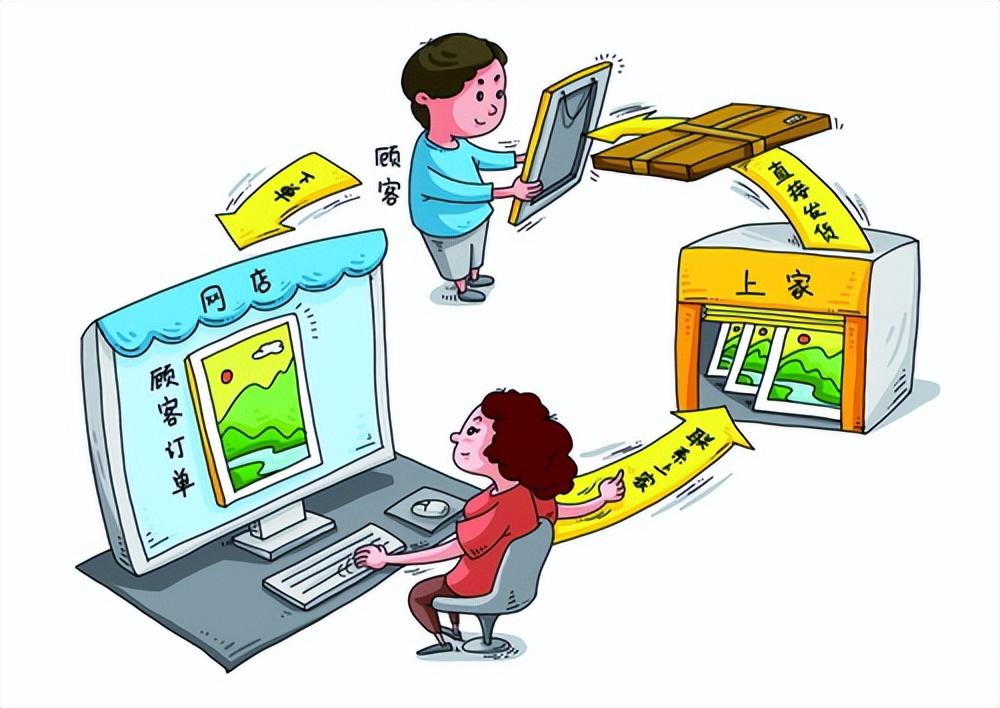There is no source of e -commerce, although the cost is low at a low price!
Author:Xiamen Daily Time:2022.08.27

Comic/Liu Zheyi
For the source factory, the goods are directly shipped by the Shangjia. This online store business model, known as zero inventory, is also known as the "non -goods source e -commerce model", which has attracted a group of people who want to start a business to join. What needs to be careful is that this business model has the risk of infringement. Recently, the Siming District Court tried many such cases.
Xiamen Evening News reporter Peng Fei Correspondent Si Fa
Case number one
Full -time Bao Ma Kai Online Store Sales Decoration Painting Sales Calculating Infringement
Ms. Chen, who is in her 30s, brought her baby full -time, and also operated online store sales of home decoration paintings in the "Pinduoduo" platform. Decorative paintings are not her production, and she does not need to buy. Instead, after receiving an order of buyers, she contacts her home and ships directly by the upper family.
In December last year, a art company in Kunshan, Jiangsu found in Ms. Chen's online store that the copyright of 6 paintings belongs to the company, and Ms. Chen sold to the public without permission. The company filed a lawsuit with the Siming District Court after notarization and preservation evidence, asking Ms. Chen to stop infringement and compensate for economic losses.
Ms. Chen explained that before she was on the shelves, she searched the Internet and did not find the registration information of these products. She also searched the same product on the platform and saw other shops with similar decorative paintings. She thought it was it. No copyright work.
Ms. Chen said that after learning about the infringement, she had been removed from the shelves for the first time. The online store was bleak, and the amount of compensation proposed by the art company was too high. I hope that the court can consider these situations.
The court trial believes that the "Work Registration Certificate" provided by the art company can prove that it is the copyright owner of the six works involved in the case. The online store run by Ms. Chen has not been permitted, and for profit, she uses similar patterns in the decoration of sales to violate the copyright of the art company.
With the consent of the parties, the judge organized the mediation of both parties. In the end, the amount of the two parties reached an agreement, and Ms. Chen paid 3,000 yuan.
Case 2
Selling sees on the platform was prosecuted to claim 6,000 yuan
After being introduced by a friend, Ms. Zhang joined a sales team to sell well -known brand glasses on the "idle fish" platform. It was only in April this year that she was sold to the court by an optical company. After authorization, the company has the right to register trademarks. The company believes that Ms. Zhang's sales of counterfeit glasses violate their registered trademark rights.
During the trial, Ms. Zhang said that the glasses came from an online mall. The sales team also taught everyone to write the word "genuine" when editing product details. Information is directly shipped by the mall. Ms. Zhang believes that she is sold on a second -hand commodity platform. She has only made more than 100 yuan and she was defendant. She did not have a negative impact on the brand.
The judge entered the anti -counterfeit code of the glasses in court to inquire for the public account of the brand, showing "no existence".
The court tried that the glasses sold by Ms. Zhang in her "idle fish" store used a large number of brand logos, but did not have genuine anti -counterfeiting codes, which proved that these are products that belong to counterfeit registered trademarks. Ms. Zhang is not a second -hand item for self -use. Although the product is purchased from him, the price of the product is significantly lower than the genuine product. Obviously, the obligations of the online store operators should not be fulfilled.
In the end, the court sentenced Ms. Zhang to 6,000 yuan based on the awareness of the trademark, Ms. Zhang's sales and sales amount.
【Judge Reminder】
When operating a shop
To purchase from legal channels
The judge said that the reason why the "no -stock source e -commerce model" frequently triggered infringement disputes is that online store operators lack the review of the legitimacy of the source of goods. Essence According to intellectual property laws such as trademark law and copyright law, operators must prove the legal source of the product from the aspects of objective and subjective: objective aspects, the facts that need to be legal, including legal purchase channels, reasonable prices and direct direct prices, and direct direct prices and direct direct prices and direct direct prices and direct direct prices and direct direct prices and direct direct prices and direct direct prices and direct direct prices and direct direct prices and direct direct prices and direct direct prices and direct direct prices and direct direct prices and direct direct prices and direct direct prices and direct direct prices and direct direct prices and direct direct prices and direct direct prices and direct direct prices. Suppliers, etc.; subjective, need to prove that they have not missed it, whether the source of the product is legal and whether the price is reasonable, etc.
The judge reminded that when operating a store, pay attention to purchasing genuine products through legal channels, carefully reviewing, and avoiding infringement disputes.
- END -
Who is responsible for drowning after dinner?| BRTV "Reading of Civil Law Code"

Wine culture has a long history in our country. Three or five friends gather toget...